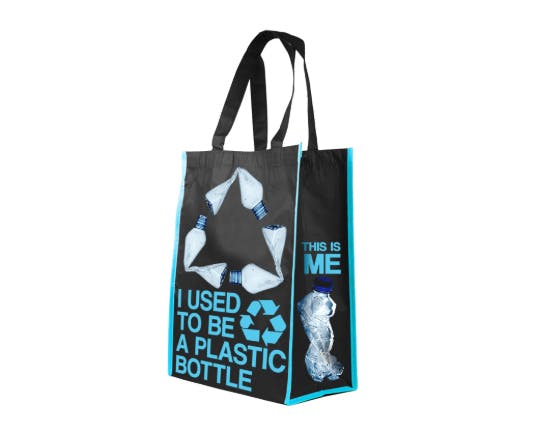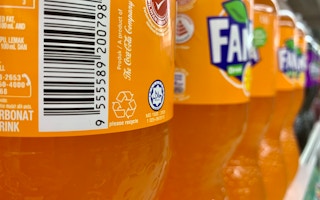The high price of recycled plastic has tempted manufacturers to mix in much cheaper virgin plastic and sell it as 100 per cent recycled material.
To continue reading, subscribe to Eco‑Business.
There's something for everyone. We offer a range of subscription plans.
- Access our stories and receive our Insights Weekly newsletter with the free EB Member plan.
- Unlock unlimited access to our content and archive with EB Circle.
- Publish your content with EB Premium.
This is a market dynamic unfolding in China, according to recycling industry sources, as the coronavirus-induced collapse in the price of oil—the raw material for making plastic—has brought the price of virgin plastic to a record low.
The price of virgin polyethylene terephthalate (PET), the most recycled type of plastic used to make drink bottles, has fallen to US$500-600 a tonne, while the price of recycled PET flakes is now US$1,000 a tonne.
“It is not difficult to imagine some recyclers blending prime materials and claiming it is post-consumer recycled content,” said Dr Steve Wong, chief executive of Fukutomi Recycling and chairman of China Scrap Plastics Association.
One of the ways that a mix of new and used plastic has been falsely marketed as 100 per cent post-consumer content is in reuseable “eco” bags made in China and sold worldwide, a recycling industry source told Eco-Business.
“
The temptation to use virgin plastic and claim it as recycled is the reason for the drive for independent certification of recycled content.
Martyn Tickner, project sourcing and development, Alliance to End Plastic Waste

A reuseable ‘eco’ bag made from PET. Image: Made-in-China.com
Reuseable bags are usually made from a mixture of PET and polypropylene (PP). But as the price of PP, the plastic used to make face masks and other personal protective equipment, has soared in recent months amid the Covid-19 pandemic, so factories in China have switched to cheaper PET to manufacture the bags, mixing virgin and recycled material.
It is almost impossible for consumers to tell the difference between virgin and recycled PET, and it’s also hard for companies that buy polymers to use in their packaging to distinguish between the plastic types without laboratory testing.
Consumer goods firms such as Mars, Nestlé, Unilever and Coca-Cola have made major commitments to boost the volume of recycled plastic they use, but these companies need to be careful that what they’re buying is genuinely post-consumer content, commented Alvaro Aguilar, a recycling professional who consults to Indonesia-based PET recycler Polindo Utama.
The pressure on companies to fulfill sustainability commitments—Unilever, for example, aims to use 25 per cent recycled content in its packaging by 2025, but currently uses less than 1 per cent—has created huge demand for recycled plastic, driving up prices, but the tools to prove the source and type of material are lacking, Aguilar noted.
“Brand owners [which are routinely blamed for plastic pollution] are eager for recycled content to fulfill sustainability commitments and will believe anything,” he said. “And suppliers will always say they can provide recycled content, as they don’t want to lose contracts.”
Manufacturers often provide a guarantee for the recycled plastic they supply, but without third-party verification to prove that the material is as claimed.
“The temptation to use virgin plastic and claim it as recycled is the reason for the drive for independent certification of recycled content,” said Martyn Tickner, the former chief executive of plastics giant HMC Polymers who recently joined the Alliance to End Plastic Waste, an industry-backed non-profit set up to tackle plastic pollution.
The push for certification is still new, as is the public awareness of plastic pollution that has prompted consumer goods firms to use more recycled plastic. “Until recently, people haven’t cared about the environmental consequences [of plastic consumption],” said Tickner.
Among the few organisations to offer comprehensive recycled plastic certification is OceanCycle, a Washington DC-based social enterprise that launched last year. It provides documented chain-of-custody traceability, from where the plastic is collected by informal waste pickers in coastal areas, to the point of delivery.
“Traceability drives demand [for recycled plastic]. Brand owners are increasingly wary of what they’re buying,” said Ryan Schoenike, co-founder and president of OceanCycle.
OceanCycle currently certifies 1,000 tonnes of recycled plastic—the equivalent of 40 million drink bottles—a month, but aims to certify 10 times that volume as the market recovers post-Covid, Schoenike said.
“
In the recycling business, there are people who have benefitted from a lack of transparency for a long time.
Josse Kunst, co-founder, CL2B
OceanCycle certifies recycled plastic processed by Bantam Materials, a UK-based recycler that supplies European retailer Lidl and packaging manufacturer Sharpak. Bantam managing partner Vytas Gruodis noted that the recycling sector is experiencing “growing pains” that stem from the lack of clear, consistent definitions of plastic types.
One problem area is the definition of ocean plastic, and misleading claims are not limited to factories in China. Multinational brand owners, including a sportswear brand and a home cleaning brand, are falsely claiming to use plastic retrieved from the ocean in their products, according to industry sources.
“Some brands are overreaching and giving consumers the impression that ‘ocean plastic’ is pulled out of the ocean bottle by bottle. This is simply not the case,” said Gruodis. “The sun and salt degrades plastic, and it is not usable for recycling. It is also not commercially viable or realistic to pull bottles out of the water at scale,” he said.
Ocean plastic that can be recycled is collected before it has entered the sea, and is more accurately known as ocean-bound plastic, or as Bantam Materials calls it, prevented ocean plastic.
Josse Kunst, a Netherlands-based materials expert who is co-founder of CL2B, a firm that advises Vietnam’s manufacturing sector on the circular economy, said the recycling sector is ripe for the introduction of material passports to bring about better traceability to supply chains.
Material passports document the contents and source of a product, helping to determine how it can be recycled and re-used. Kunst suggested that blockchain technology could support the introduction of material passports, and help to build a circular economy for plastics.
But he warned that there would be resistance to technological innovation. “In the recycling business, there are people who have benefitted from a lack of transparency for a long time,” he said.
Such innovation will require investment in a sector that been crippled by the Covid-19 pandemic, Kunst noted. Investments backed by multinational brands such as Circulate Capital’s funding of recyclers in Indonesia and India and Mirova’s investment in South Asia will need to factor traceability to allow the circular economy to find its footing.














